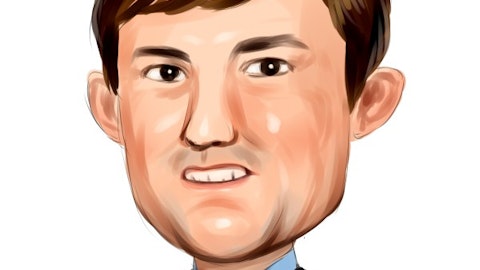David Karnovsky: Thank you.
Operator: Thank you. One moment for your next question. Our next question comes from the line of Michael Graham with Canaccord Genuity. Your line is now open.
Michael Graham: Hi, thank you. Wanted to ask two. The first one is on the sort of cadence of the negative sports outcomes that you mentioned. I know you’ve reaffirmed guidance at the end of August. I’m just wondering if maybe some of that stuff happened, you know, pretty late in the quarter or just maybe talk about specifically the month of September. And then, I just wanted to ask if you had any updated thoughts on the long-term profitability roadmap in the U.S.. I know you are solidly profitable. I’m just wondering if you have any updated thinking around, you know, how long it takes the U.S. to get, you know, closer to your corporate average. Thanks.
Carsten Koerl: Very good. So, I’ll take the first part and then I’ll leave the U.S. piece to Gerard if you allow. Looking now into the correction and the MTS, the mechanism here is that we have a revenue share from the Gross Gaming Revenues of the operator. So, when the operator has more profitability because we manage the risk better for them, we have a higher proportion on their share. Now, it is from a risk management perspective, you are looking to the biggest pools from a liquidity perspective. So, with that, this has happened in Europe or the Rest of the World, not in the U.S., because we are speaking about favorable soccer results. Favorable soccer results means favorites are winning. So, we had that effect. And we are not the only one; all the companies reporting public had the same effect.
Think of it, as if you’re giving a loan to the better, so the better will win this; but sooner or later, the operator will win it back if they offer consistently the risk management which we provide to them. And, yes, favorites winning is something nobody can avoid. It happens. It happens quite frequently in this business. It’s nothing to be worried about. It’s simply a winning streak, which we are facing. And it comes together with goals in the last minutes, which is not good from a risk management perspective and the number of high goals. Readjusted our algorithms, we think we have taken well care of this effect. But as I said, it’s a revenue share base, so that has an effect on our MTS results. And we face this with the beginning of the soccer season, which is in quarter three.
And maybe, the very last piece of this is, if you compare this quarter soccer to the quarter in the last year, you will see that in the last year we had the World Cup, a lot of matches have been shifted. So, proportionally, we had significantly more soccer matches in quarter three last year than we have in this year. So, the year-by-year comparison is also affected partly because of this. I hand over to you, Gerard, for the second part.
Gerard Griffin: Yes. When you think about the U.S. – and some of what I’m going to say actually applies to our broader business. If you think about some of the major, you know, content deals we have in place like – Carsten talked about the NBA in his prepared remarks. If that deal evolves over its lifetime, you know, the back half of that deal is significantly more accretive from an EBITDA point of view than the earlier years when we’re dealing with, you know, straight line of the amortization costs. But, obviously, a growing revenue base. So, when you think about the U.S. given the size of the U.S., that will have a meaningful impact on that business over the coming years as we think about more long term. The other aspects of the business, we have the content portfolio today to serve that business and grow that business.
We talked about that in our prepared remarks. But as more states open up and as live betting evolves, that’s obviously going to deliver a stronger revenue contribution of what is essentially a fixed base of business from a cost point of view. So, there’s going to be operating leverage that will be triggered. So, from a U.S. perspective, we feel confident that the growth opportunities there, both structurally and what we’re doing to enhance our product portfolio, and that will lead to an expanded margin profile and will definitely bring the U.S. up over the coming years. And more broadly, it’s the same concept if you think of our Rest of World whether it’s the ATP deal or whether it’s the NBA deal, you know, the structure of these deals are such that they are going to be very nice contributors to margin expansion as we think through the lifetime of the deal.
Little bit of a wait at the start, but they are obviously going to enable us to drive better margins outside of what we’ve said already – which is keeping a close eye on our operating structure and making sure we’re driving the right kind of product innovation to deliver value add to our client base.
Michael Graham: Okay, that’s helpful. Thank you so much.
Operator: Thank you. One moment for our next question, please. Our next question comes from the line of Jason Bazinet with Citi. Your line is now open.
Jason Bazinet: I just had a quick question on that faster-than-20% rev growth, greater-than-20% EBITDA growth next year. I think that means consensus estimates have to move up. And so, I was just wondering if you could may be highlight what are the two or three most notable risks to achieving those sort of growth rates?
Carsten Koerl: Gerard, would you take up that question from Jason?
Gerard Griffin: Yes, obviously, I’ll start with profitability, and I’m going to give you an Irish answer – so apology. But if we decide to not focus on managing our operating costs and we see a gradual creep back in our employee base in terms of our labor costs, you know, that would obviously impact the level of operating leverage that we believe we can deliver in 2024 and beyond. You know, the actions we’re taking this week, while difficult, due position us for strong operating leverage over the coming years. From a revenue perspective, you know, again, the content portfolio is in place and the product offering is in place. So, it would have to be, you know, more macro factors – does the U.S. open up at a slower pace; is there anything else structurally wrong which we don’t believe in any of our markets.
I don’t see any material issues. Obviously, if the world changes and the better is continually on a stronger winning streak which has not historically been the case, that could impact some of our revenue shares. But as I stand here today, looking at our assumptions for 2024, we feel good about delivering at least 20%, given the strength of our content and what we’re doing to enhance the monetization of the product portfolio.
Jason Bazinet: That’s great. You know, if I could just ask one follow-up. You guys mentioned that you don’t need any more rights. And you may buy more rights but you don’t need them. Would you say that’s a new chapter in the evolution of your company, or could you have said that a year ago or three years ago?
Gerard Griffin: What I would – sorry, Carsten, if you want to go ahead.
Carsten Koerl: Go ahead, Gerard. No, no, go ahead. So, I think you can do this perfect.



